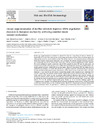Please use this identifier to cite or link to this item:
https://accedacris.ulpgc.es/jspui/handle/10553/114482
| Title: | Dietary supplementation of Bacillus velezensis improves Vibrio anguillarum clearance in European sea bass by activating essential innate immune mechanisms | Authors: | Monzón Atienza, Luis Ernesto Bravo García, Jimena Fernández Montero, Álvaro Charlie-Silva, Ives Montero Vítores, Daniel Ramos Vivas, Jose Galindo-Villegas, Jorge Acosta Arbelo, Félix Antonio |
UNESCO Clasification: | 310502 Piscicultura 310903 Inmunología |
Keywords: | Candida Albicans Dicentracin Dicentrarchus Labrax Immunomodulation Innate Mechanisms, et al |
Issue Date: | 2022 | Journal: | Fish and Shellfish Immunology | Abstract: | Bacillus spp. supplementation as probiotics in cultured fish diets has a long history of safe and effective use. Specifically, B. velezensis show great promise in fine-tuning the European sea bass disease resistance against the pathogenicity caused by several members of the Vibrio family. However, the immunomodulatory mechanisms behind this response remain poorly understood. Here, to examine the inherent immune variations in sea bass, two equal groups were fed for 30 days with a steady diet, with one treatment supplemented with B. velezensis. The serum bactericidal capacity against live cells of Vibrio anguillarum strain 507 and the nitric oxide and lysozyme lytic activities were assayed. At the cellular level, the phagocytic response of peripheral blood leukocytes against inactivated Candida albicans was determined. Moreover, head-kidney (HK) total leukocytes were isolated from previously in vivo treated fish with LPS of V. anguillarum strain 507. Mechanistically, the expression of some essential proinflammatory genes (interleukin-1 (il1b), tumor necrosis factor-alpha (tnfa), and cyclooxygenase 2 (cox2) and the sea bass specific antimicrobial peptide (AMP) dicentracin (dic) expressions were assessed. Surprisingly, the probiotic supplementation significantly increased all humoral lytic and cellular activities assayed in the treated sea bass. In addition, time-dependent differences were observed between the control and probiotic treated groups for all the HK genes markers subjected to the sublethal LPS dose. Although the il1b was the fastest responding gene to a significant level at 48 h post-injection (hpi), all the other genes followed 72 h in the probiotic supplemented group. Finally, an in vivo bacteria challenge against live V. anguillarum was conducted. The probiotic fed fish observed a significantly higher survival. Overall, our results provide clear vertical evidence on the beneficial immune effects of B. velezensis and unveil some fundamental immune mechanisms behind its application as a probiotic agent in intensively cultured European sea bass. | URI: | https://accedacris.ulpgc.es/handle/10553/114482 | ISSN: | 1050-4648 | DOI: | 10.1016/j.fsi.2022.03.032 | Source: | Fish and Shellfish Immunology [ISSN 1050-4648], v. 124, p. 244-253, (Mayo 2022) |
| Appears in Collections: | Artículos |
SCOPUSTM
Citations
34
checked on Jun 8, 2025
WEB OF SCIENCETM
Citations
41
checked on Jan 25, 2026
Page view(s)
46
checked on Jan 10, 2026
Download(s)
24
checked on Jan 10, 2026
Google ScholarTM
Check
Altmetric
Share
Export metadata
Items in accedaCRIS are protected by copyright, with all rights reserved, unless otherwise indicated.
